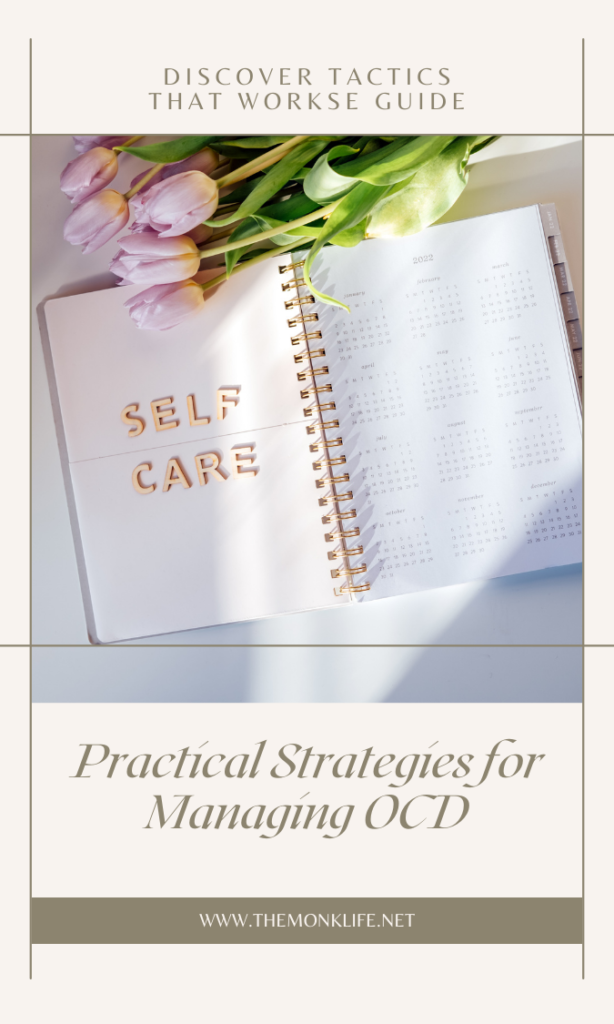Practical Strategies for Managing OCD: Discover Tactics That Works

Obsessive Compulsive Disorder (OCD) is a challenging condition that affects quite a number of people, approximately 1.2% of adults in the United States and 1% in Canada. Living with OCD means contending with intrusive thoughts and urges that repeatedly enter your mind.
Akin to being trapped in a repetitive cycle, these compulsive behaviors lead you to act almost mechanically. Although they offer an attempt to relieve the anxiety linked to the obsession, they result in a cycle that proves challenging to break.
But guess what? Many strategies can help you easily manage OCD, and if you practice and keep trying, you might get more control over those tricky thoughts and actions.
Strategies You Can Take to Manage Your OCD
Right now, there’s no cure for OCD, but there are awesome tricks and strategies to make it easier. With the right help and taking care of yourself, you can have a super fun and happy life!
Here are some cool tricks to manage your OCD:
Table of Contents
Acknowledge and Let Go of Intrusive Thoughts
A key component of OCD is the tendency to resist or argue with intrusive thoughts. This fuels the obsessions and makes them seem more threatening. What you can easily do is accept or try to manage intrusive thoughts as just thoughts and nothing more.
Let them come and go without judging or attaching meaning to them because it will often backfire if you try to suppress the thoughts. Allow the thoughts to pass through your mind without reacting.
Like leaves floating down a stream, thoughts will come and go. Don’t grab onto them. Accept uncertainty and the lack of control over your thoughts. The content of the thought does not define you as a person. So, you can acknowledge and let go of the thought without agreeing with it.
Seek Support Through the AA 12 Steps Program
Although initially designed for alcoholism, it’s an excellent support strategy for many other conditions, including OCD, as it utilizes the core principles of surrendering control, accepting powerlessness over the disorder, and committing to regularly working on each step.
The AA 12 Steps program of Alcoholics Anonymous provides a structured path to recovery by building hope, faith, courage, willingness, humility, and love.
Resist Compulsions and Rituals
People perform compulsions and rituals to alleviate anxiety and make intrusive thoughts go away. However, compulsions only provide temporary relief and reinforce the obsessions.
If you want to break free from OCD, you must resist the urge to carry out compulsive actions. You may find this difficult at first, but it will get easier with practice.
Stop and take a mindful breath when you feel the urge to perform a compulsive ritual. Remind yourself that by resisting the compulsion, you are actively combatting your OCD.
Reduce Stress and Anxiety
In most people, stress makes OCD symptoms worse. Thus, stress management needs to be a regular part of your routine. Set aside time each day to relax and unwind through activities like light exercise, listening to music, meditation, spending time in nature, or engaging in a hobby. Try to maintain a healthy diet and stick to a good sleep routine as well.
Reduce unnecessary sources of stress in your life. Develop a calm, non-reactive mindset. This will help minimize anxiety and reduce obsessive urges.
Create a Coping Kit
Prepare a “coping kit” with items that help distract, soothe, and empower you when OCD flares up. This could include a fidget toy, coloring book, photos of your loved ones, inspirational quotes, positive affirmations, a favorite book, or a puzzle book.
Keep it near you so that you can access it anytime. When obsessions arise, use this kit to distract yourself and avoid giving in to compulsions.
Talk Openly With Your Loved Ones
Don’t keep your struggles with OCD hidden from your loved ones. Secrecy and shame feed obsessive-compulsive tendencies. Reveal to your trusted friends and family members. Tell them specific ways they can help you manage, such as not providing reassurance when you seek it compulsively.
Ask them to check in on your progress and encourage you. Share successful coping strategies with them. You don’t have to face this alone. Support from your loved ones can make a real difference.
Practice Exposure Therapy Techniques
Exposure therapy is like an antidote for OCD. It means facing your worries a bit without doing your habits. This helps you get used to the scared feelings and makes OCD less powerful.
Keep an OCD Journal
Keep a journal to record your OCD episodes, including the triggering situation, thoughts, and compulsions. Note how severe the episode was and rate your anxiety level. Also, write down successful coping strategies.
Review this journal to identify patterns, triggers, and progress. Record thoughts that help ground you and weaken OCD’s power. Share insights from your journal with your therapist or doctor as well.
Pursue OCD Therapy
Going to a specialist for OCD, like a therapist, gives you incredible tools and support. They might use things like talking, facing fears slowly, and staying in the present moment. Meeting other people with similar challenges in a group can be awesome, too.
Getting better takes time and practice, like leveling up in a game. It’s not super quick, but if you use the right strategies, you can break free from OCD’s hold. Even if it feels tough sometimes, keep going and listen to your inner superhero voice.
Seek Professional Help
While the strategies discussed above are beneficial, managing OCD often requires working with a mental health professional for guidance. The most effective treatment you can take includes:
- Cognitive behavioral therapy (CBT) from an OCD specialist. This involves ERP therapy and thought restructuring
- Mindfulness-based therapy to reduce stress reactions to obsessive thoughts
- Acceptance and commitment therapy (ACT) focuses on accepting intrusive thoughts without reacting to them
- Exposure therapy, such as virtual reality programs that simulate feared situations
With professional support, you will gain new perspectives and skills to manage OCD symptoms successfully.

Conclusion
While there are currently no cures for OCD, the condition is certainly manageable, especially when employing effective strategies such as living in the present, confronting fears gradually, keeping an OCD journal, setting recovery goals, and seeking specialized support. You can have a really enjoyable life with lots of effort and kindness. Just keep practicing those strategies to keep OCD from causing too much trouble.





